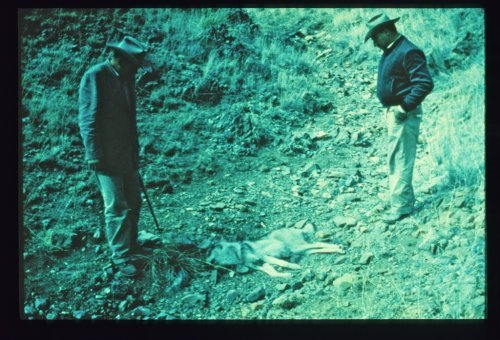30
May
In the News: U.S. Sued Over Policy on Killing Endangered Wildlife

Environmental groups are taking the Justice Department to court over a policy that prohibits prosecuting individuals who kill endangered wildlife unless it can be proved that they knew they were targeting a protected animal.
Critics charge that the 15-year-old McKittrick policy provides a loophole that has prevented criminal prosecution of dozens of individuals who killed grizzly bears, highly endangered California condors and whooping cranes as well as 48 federally protected Mexican wolves.
The policy stems from a Montana case in which Chad McKittrick was convicted under the Endangered Species Act for killing a wolf near Yellowstone National Park in 1995. He argued that he was not guilty because he thought he was shooting a wild dog.
McKittrick appealed the conviction and lost, but the Justice Department nonetheless adopted a policy that became the threshold for taking on similar cases: prosecutors must prove that the individual knowingly killed a protected species.
The lawsuit charges that the policy sets a higher burden of proof than previously required, arguing, “The DOJ’s McKittrick policy is a policy that is so extreme that it amounts to a conscious and express abdication of DOJ’s statutory responsibility to prosecute criminal violations of the ESA as general intent crimes.”
WildEarth Guardians and the New Mexico Wilderness Alliance said they intend to file a lawsuit Thursday in U.S. District Court in Arizona, one of the states where Mexican wolves were reintroduced. The Times received an advance copy of the lawsuit.
Federal wildlife managers who are responsible for protecting endangered animals have long criticized the policy as providing a pretext for illegal trophy hunters and activists.
A June 2000 memo from the law enforcement division of the U.S. Fish and Wildlife Service in Wyoming warned, “As soon as word about this policy gets around the West, the ability for the average person to distinguish a grizzly bear from a black bear or a wolf from a coyote will decline sharply. Under this policy a hen mallard is afforded more protection than any of the animals listed as endangered.”
Earlier this year, a man in Texas shot and killed a whooping crane, telling authorities that he thought it was a legally hunted Sandhill crane. He was not charged under the Endangered Species Act but was prosecuted under the Migratory Bird Treaty Act, which carries lesser penalties.
Wendy Keefover of WildEarth Guardians compared the policy to “district attorneys rescinding speeding tickets issued by traffic cops when then speeder claims he or she believed the legal speed limit was greater than what was posted, and that he or she had no intention to break the law.”
The unspoken attitude toward endangered species among some western ranchers is summed up by the expression: “Shoot. Shovel. And shut up,” suggesting that the most efficient way to deal with the unwanted bureaucracy associated with protected species was to quietly remove them.
Mexican wolves have been decimated by illegal shootings, causing the death of more than half of the animals released in the wild since the start of the reintroduction program in 1998.
Forty-eight Mexican wolves have been illegally killed, according to the lawsuit. It notes that the U.S. Fish and Wildlife Service anticipated that illegal shooting and trapping was likely to be a major impediment to recovery of the species, but the agency thought that strong enforcement could discourage the illegal acts.
Wolves are often killed by hunters who say they thought they were shooting at coyotes, which may be shot on sight in most states.
Mistaken identity is also frequently given in mix-ups between black bears and grizzly bears that lead to grizzly deaths.
The Wyoming U.S. Fish and Wildlife Service memo included this example:
In May 1996, a man hunting for black bear in Wyoming shot and killed a collared grizzly bear, an endangered species.
The hunter and three friends moved the bear carcass, destroyed the collar, dug a hole, dumped in the bear, poured lye over it and covered the hole.
When the animal’s remains were recovered, the man said he thought he was shooting at a common black bear.
The U.S. attorney’s office reviewed the case and declined to prosecute it, citing the McKittrick policy.
*****
This article appeared in the Los Angeles Times on May 29, 2013.
http://www.latimes.com/news/local/la-me-0530-endangered-species-lawsuit-20130530,0,4576062.story



